Notes
Ruddy Roye from Jamaica: The Hardest Time We Have Ever Had To Go Through
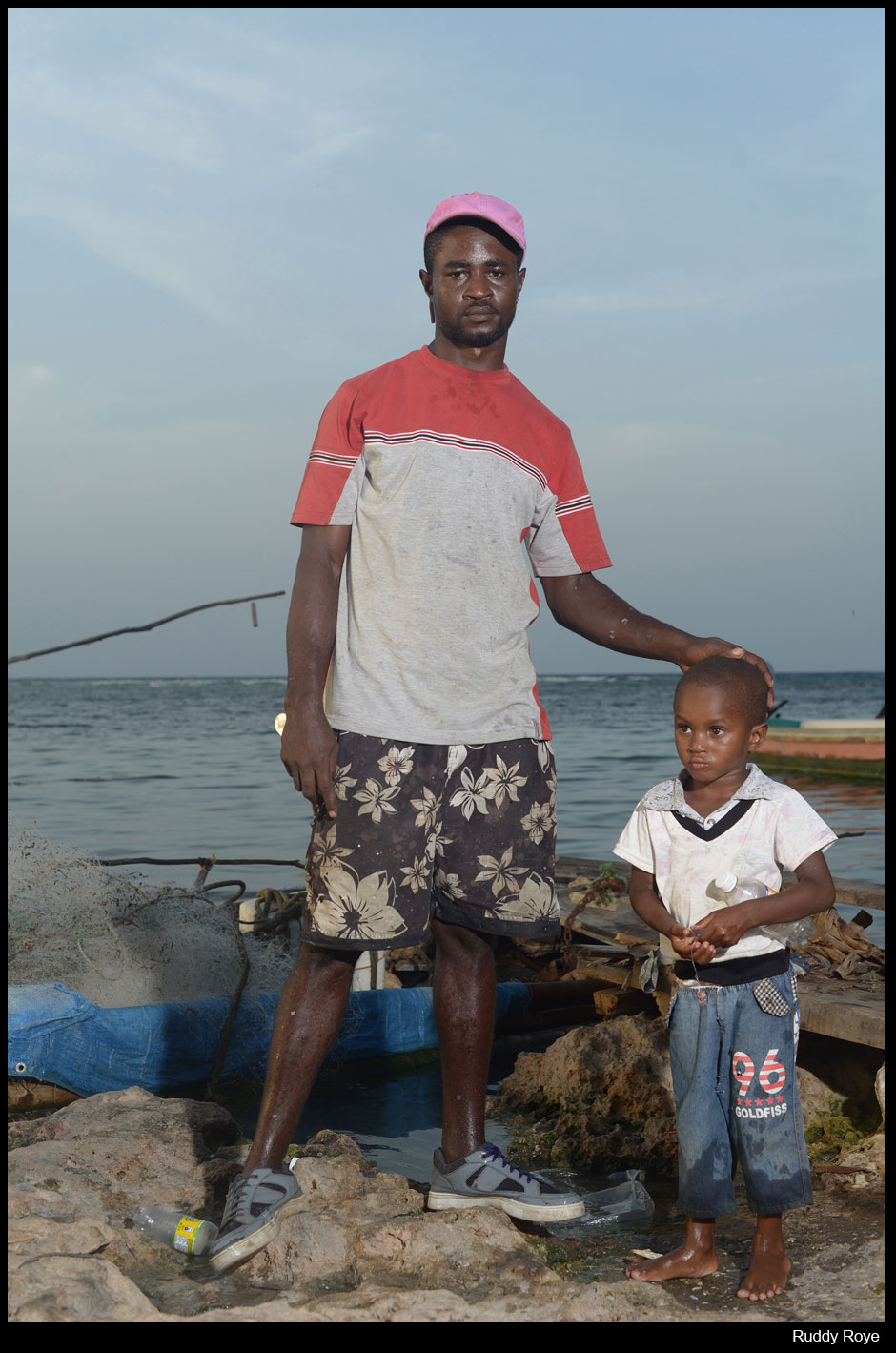 Orain stands with his 4-year-old son Ryan on the boat he uses to catch seafood to feed his family. He has already started to teach his son how to be a fisherman.
Orain stands with his 4-year-old son Ryan on the boat he uses to catch seafood to feed his family. He has already started to teach his son how to be a fisherman.
I work in Jamaica. Each year whenever I visit my home of Montego Bay, it is difficult to avoid the stark faces of suffering people living in what I can only describe as a stagnant existence. I am both conscious and aware of the slow struggles of some the Jamaican people, especially poor people as they innovate in order to survive.
The guys I left on the street side hustling on their small stall are the same faces I go back and see but with less wares on their stalls. Their empty stalls are a clear indication that the rising cost of living induced and maintained by austerity measures was making it impossible for them to eek out a living. It is not easy to meet eyes with someone who is hungry. Poor people are constantly faced with a soaring food and clothes prices and a devaluing dollar. Its cheaper to buy imported food than it is to buy from local farmers. High rent and the unforgiving baton of the police when vending on the streets becomes your only option.
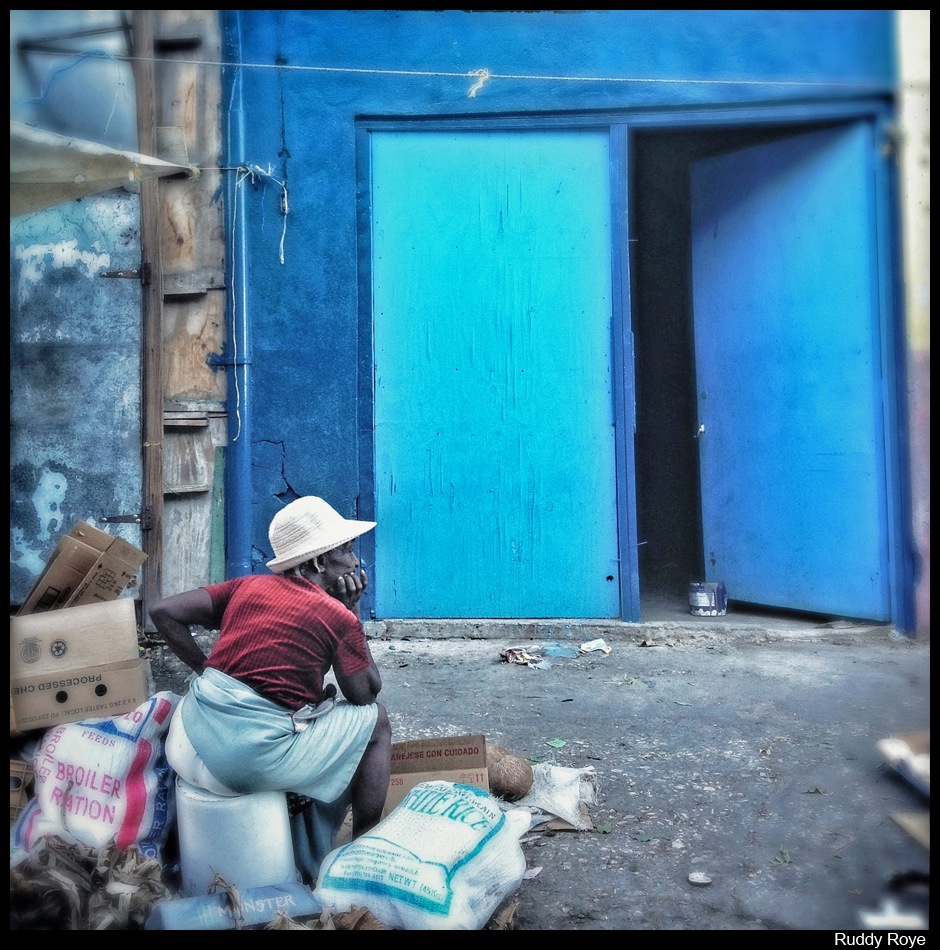 A street vendors sits in contemplation at the slow sales she was having for the day.
A street vendors sits in contemplation at the slow sales she was having for the day.
Vendors sometimes risk losing all their wares if caught selling in an illegal section of the city. Ironically, as young people seek education as a means of escape from a life of struggle, or to have a better foothold in an unstable economy, one of the stipulations of the International Monetary Fund is that the Jamaican government reduces how much it spends on education. Further studies by the CEPR this year has revealed that poverty in Jamaica has doubled.
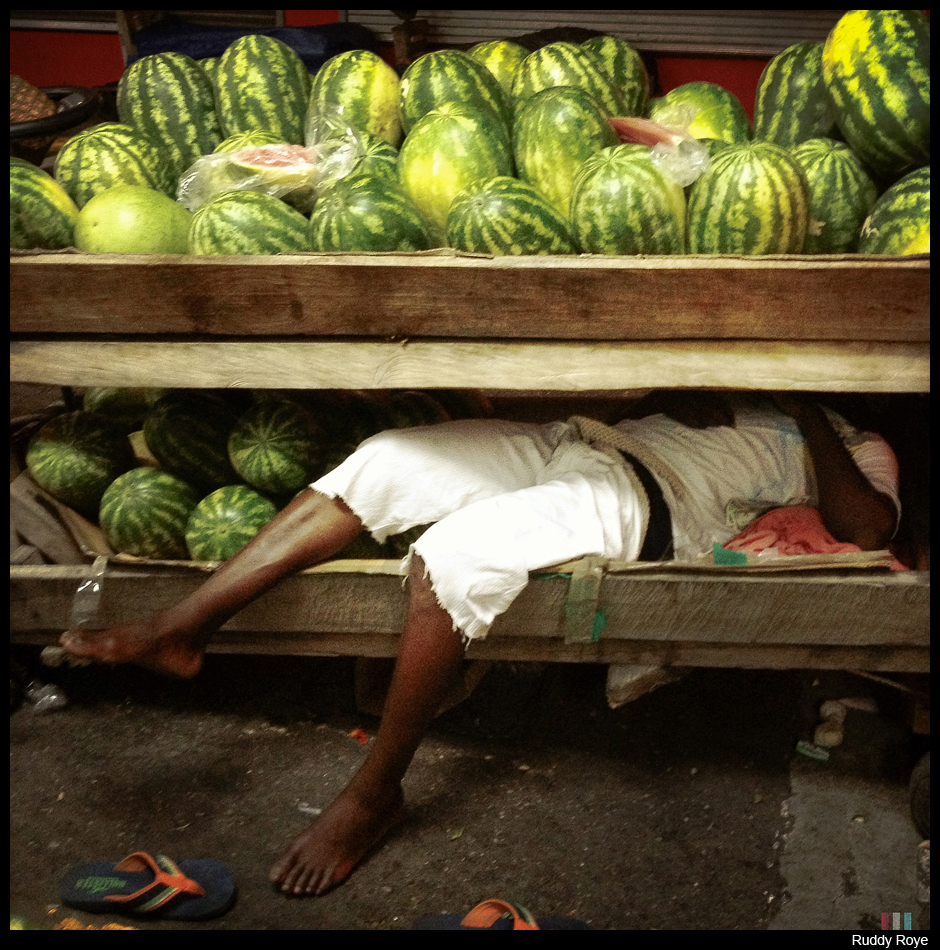 Melon vendor sleeps on his cart.
Melon vendor sleeps on his cart.
The IMF throughout my life has been accused of being the architect of further impoverishing my already poor country of Jamaica. The newspapers have reported that the IMF’s policies have helped to increase crime rates and generally create an almost unlivable instability in the Jamaica economy. Earlier this year the IMF approved a new lending agreement with the Jamaican government worth about $932 million, with a further commitment from the World Bank which made the total loan package around $2 billion. Again, I am assuming that this agreement was met with the sole purpose of getting the Jamaican debt on a downward path, but according to an IMF official, “most of the debt reduction will come from very tight government budgets.
Put in simple terms, the government will have to live within its means and improve its financial position over time. Sustaining this approach will be a serious challenge, but there is no alternative. The benefits of this effort will become very evident over time,” as reported by the center for economic and policy research. Since then, the agreement has received some skepticism even from its lenders, claiming that they could not see how Jamaica could adhere to the project’s conditions. In the meantime, most Jamaicans will continue to suffer from stagnant economic growth and reduced investments in needed infrastructure and public works.
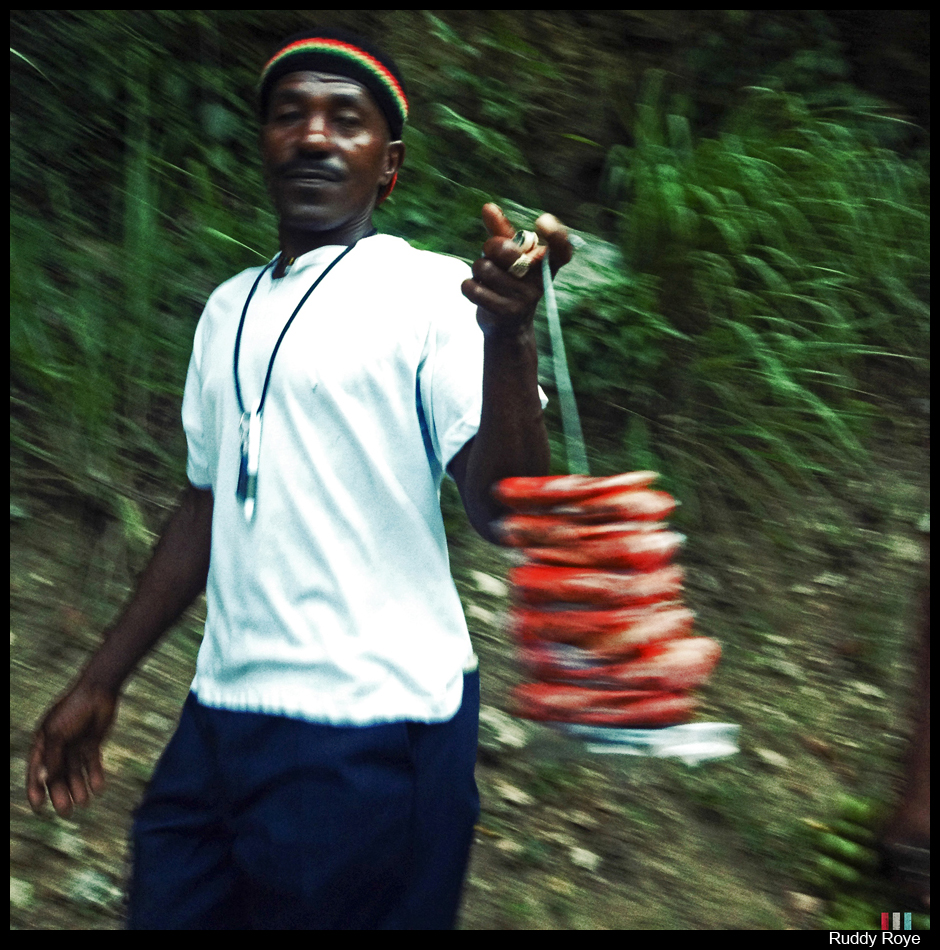 Highway shrimp vendor. Because of the hard economic times in Jamaica, more and more people see small time vending as a way of making ends meet.
Highway shrimp vendor. Because of the hard economic times in Jamaica, more and more people see small time vending as a way of making ends meet.
It was either mining or farming. There was a time not long ago when a student was taught that two of Jamaica’s chief exports were bauxite and coffee. Mining and agriculture was how I recalled Jamaica making its money. Today, tourism tied with remittances is Jamaica’s top source of revenue.
While the tourism industry earns about 50% of the country’s total foreign exchange earnings and provide about a quarter of all jobs in Jamaica, some of these same workers can hardly find food at the end of the week as the money runs out quickly. One of the problem they cite is that they are being paid in Jamaican dollars while the earn US dollars for their hotels. A starting salary ranges from about JA$6000 – JA$10,000, that is US$60-US$100 per week.
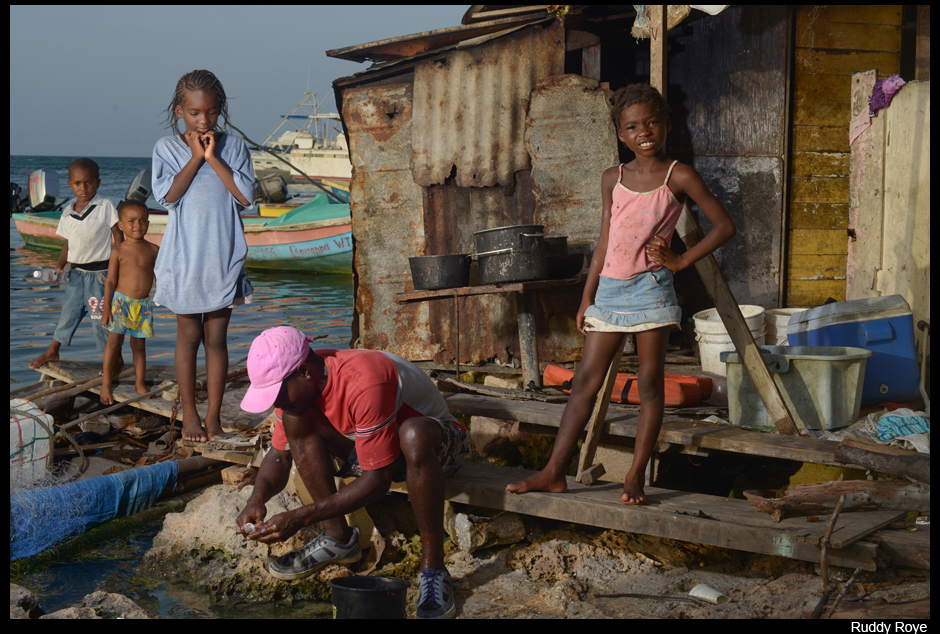 Orain sits with his family as he prepares the fish he will make for their dinner.
Orain sits with his family as he prepares the fish he will make for their dinner.
On recent returns to the island, the lush green strands of sugarcane leaves that once reached up to clean the sky like a window wiper were replaced by four squares of deep murky water. A water treatment plant that serviced a nearby housing scheme now sends its rancid stench up into the same sky, spreading its stink like incense. I thought that this decision was one of the most ludicrous one I have ever seen. How does one replace crops with feces? As I head into the centre of the city the clouds of stink followed me like a smoke signal. I disembarked my car after I had parked and was immediately met by voices that spoke with grim expressions. Mouths that could do no better than to voice the inescapable cry of the streets opened up and wailed:
“The dollar keeps falling, we have no jobs and the thieving government is all about themselves.”
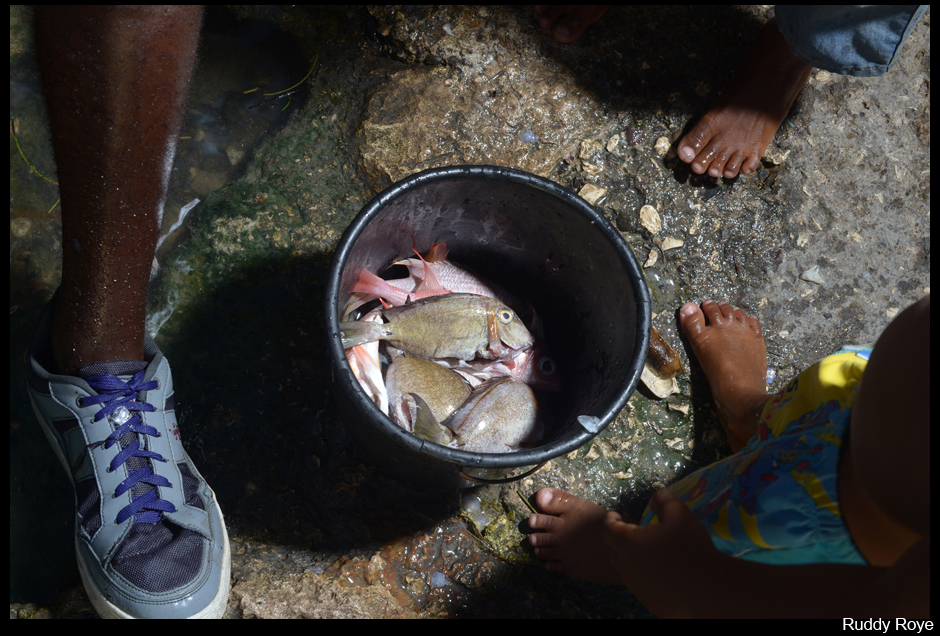 This is the fish dinner Orian Hamilton is preparing for him and his family
This is the fish dinner Orian Hamilton is preparing for him and his family
Orain Hamilton, a 25-year-old fisherman, said that he found it difficult to build a future on his meager earnings. Hamilton, who works from 6am to 6pm, said that he hardly made enough to take care of his common law wife and three children.
“This ‘ranch’ is what I can afford,” he said. A one bedroom house made of mismatched board, and pieced together with zinc and ‘faith,’ nestled like the Pisa tower by the edge of the very small fishing village. On a good day, Hamilton will earn JA$3500, or US$35 per day. On some days he returns without a single fish in his net and has to then do odd jobs like scale the fish of another fisherman before selling it to the buyers. Without the need to pay utilities like light and water, Hamilton said that most of his money is spent on making his family comfortable.
“Things do not get bad until I cannot care for them, like now, I injured my leg and cannot go out to sea. Without healthy insurance I have to stay home until I get better.”
He explained that although he does not pay for certain amenities, he still has to buy things like candles for light or fuel for lamps, At $250 every two or three days, food is either day to day or JA$7000 per week, he cannot afford an engine for his boat so he uses a stick to row 10-20 miles out to sea.
“This life is really a hustle. We throw lines, shoot fish and plant our fields. Here we hustle because it is better than stealing.”
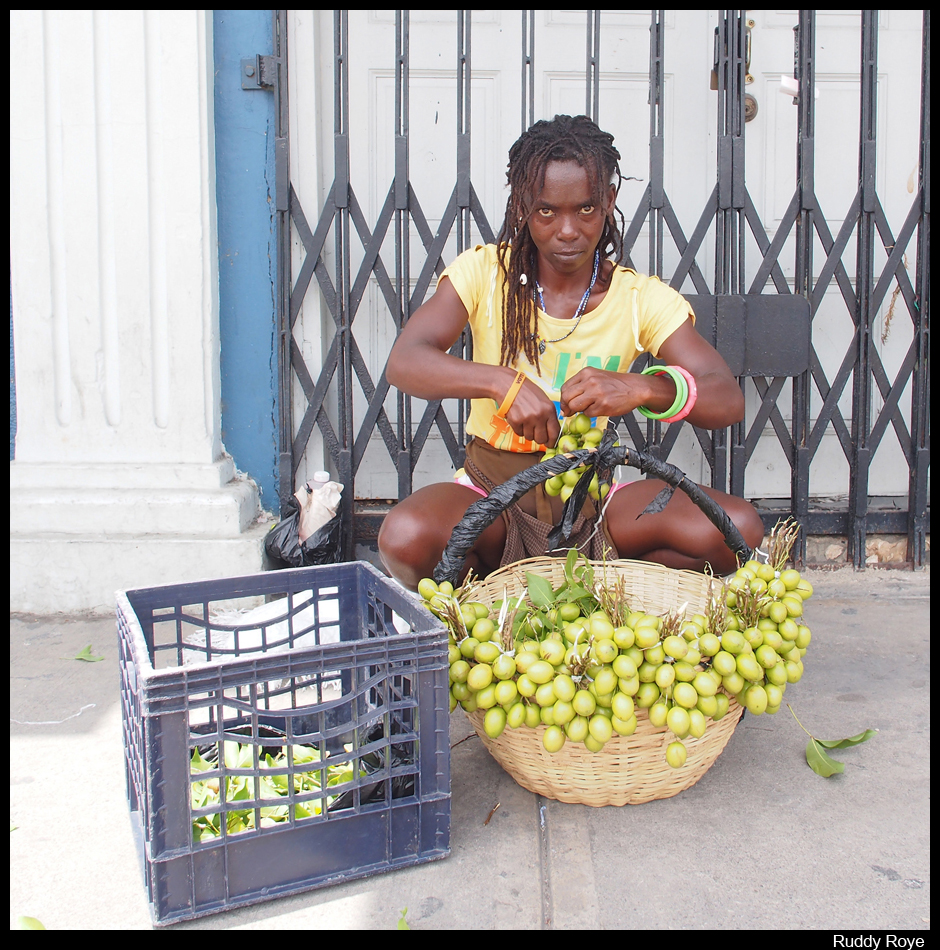 Natasha Marshall sells fruits to feed her five daughters and herself.
Natasha Marshall sells fruits to feed her five daughters and herself.
I met thirty-eight-year old Natasha Marshall in Sam Sharpe Square as she stooped over a basket of guineas tying them up and getting them ready for sale. She was humming to herself, “No money no deh. You cannot find money anywhere,” she said in a distressed voice. She said that out of her little basket, she has to find a way to pay rent, JA$3500 per month, US$ 35, JA$3000 for grocery, US$ 30, JA$2000 on light, US$ 20, “left to how we use it” and JA$1500 for water US$15. Marshall who is the mother of five girls said that her vending does not give her any security for she and her family.
“I am here selling these guineps just to put food in our mouths. Meanwhile the government does not seem to understand that we need jobs. You tell me why this is?” she asked.
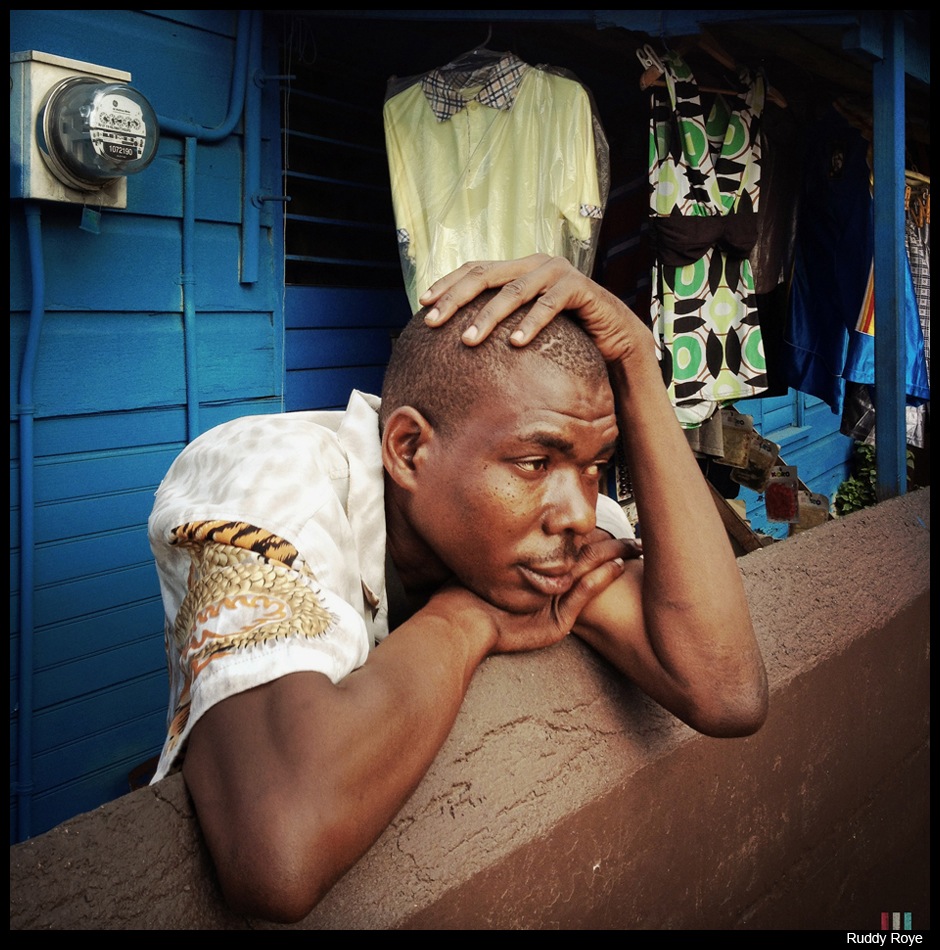 Mark Evans says that because of the increase in responsibilities since his mother’s death he fell behind on his water bills and as a result it was disconnected. Since then he has to be carrying water from his neighbor’s yard.
Mark Evans says that because of the increase in responsibilities since his mother’s death he fell behind on his water bills and as a result it was disconnected. Since then he has to be carrying water from his neighbor’s yard.
Mark Evans says he is trying to take his rough life easy. The forty-two-year old makes a living selling clothes and knick knacks on the street of Gravel Lane. On his modest cart he sells clips and bubbles, shorts, shirts, underpants, shoes, rags and soap, scouring pads and rat poison. “I have about JA$10,000 US$100 worth of stock on my stall. Things are slow though, especially the summers. I sell more things around school time.”
Mark, who recently lost his mother, said life has gotten harder since her passing. He said that now his responsibilities have increased. He pointed out that food, which is the most important expense for him, is getting harder to come by. Spending just over JA$2500 a week, he said that it was hard sticking to a pure vegetable diet.
“I don’t have a lot of expenses, but I am responsible for water in my house. Right now the Water Commission cut it off because it soared up to JA$153,000 US$1530, because I could not keep up with the payments. I have to now carry water from my neighbors to my house just to cook or clean myself.”
Mark Evans said that, although he has family in the United States who at one time in their lives shared the same pot when they were living in Jamaica, they seem to have forgotten him.
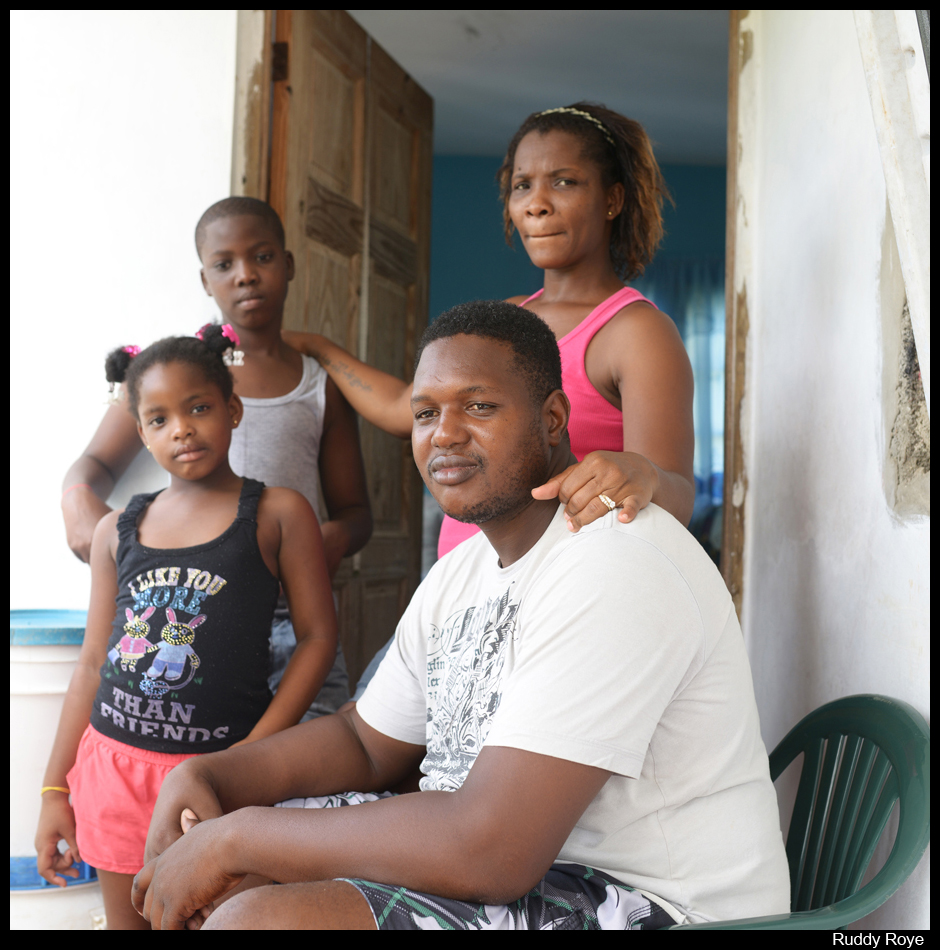 Dwayne Senior sits on his veranda to talk about how he and his family exist in Jamaica’s hard economy. He is with wife Sharon, daughter Tashwayne, Abbriana Senior and stepson, Godfrey Rodriquez.
Dwayne Senior sits on his veranda to talk about how he and his family exist in Jamaica’s hard economy. He is with wife Sharon, daughter Tashwayne, Abbriana Senior and stepson, Godfrey Rodriquez.
I eat jerk chicken most nights from Dwayne Senior. He is the father of three children, and night after night I watch him, sometimes dragging his family out to help him until the wee hours of the morning, in order to “make ends meet.” Sharon, his wife, handles the orders and the money, his step son Godfrey runs around with half of his head in the cooler where he fetches the sodas the customers might order, and the other half playing a game on his parent’s smart phone or watching the vibrant night life. His sister Tashwayne-Abbriana is responsible for loose cigarettes, Advil, peanut, or any other confection that a customer might request.
Most kids are asleep when this family is at work. They stay up until sometimes 6am. On this particular night much is expected of the extra hands. Its Independence night and Dwayne expects a high volume in sales.
 The Senior’s all pitch in on holidays so that the night can be smoother for dad Dwayne Senior.
The Senior’s all pitch in on holidays so that the night can be smoother for dad Dwayne Senior.
“It has always been like that. I usually sell all the chicken I bring to the road on this holiday,” he said. But on this Independence night it was not going too well.
“It has never been this tough,” he said shaking his head. “I use to sell off three to four buckets which had a dozen chicken in each bucket easy on a night like tonight,” he opened up. He attributed the fall in unemployment and the increase in all inclusive hotels as one of the reason for the drop in sales.
On a good night Dwayne said that he made JA$30,000, US$300 for the three nights he works. He comes out Thursday, Friday and Saturday nights on the hip strip where there is a good mixture of locals leaving the clubs and tourists enjoying the night life and, especially, the Montego Bay mood. But the tourists, he said, have almost disappeared, and Montegonians are not spending money like they use to.
“Everybody is complaining that this is the hardest time we have ever had to go through in the country.”
Senior, who opened up an auto parts business, said that it is his back up plan, “in case I get injured and can’t work the nights.” Sharon runs the business and sells things like lubricants, filters, and spark plugs.
“The extra money helps when we need to buy uniform and books especially when the children need to go back to school,” she said. The Seniors said that they spend almost JA$40,000, US$400 in expense every month.
As the voices of the street puffed up and floated around my head without an answer to give or even an idea to build on, I think about how quickly our government is in selling pieces of this country’s resources to foreign investors.
While this new deal with the IMF is seen as a saviour from Jamaicans home and abroad, there are some who feel that the deal might yield too little growth to make any meaningful difference. While an increase in employment is one of the primary ills the money will help to fix, others believe that the greed and selfishness displayed by our politicians will yet again see the country sliding into the clutches of what people on the street call, “the blood sucking IMF.”
PHOTOGRAPHS and text by Ruddy Roye.

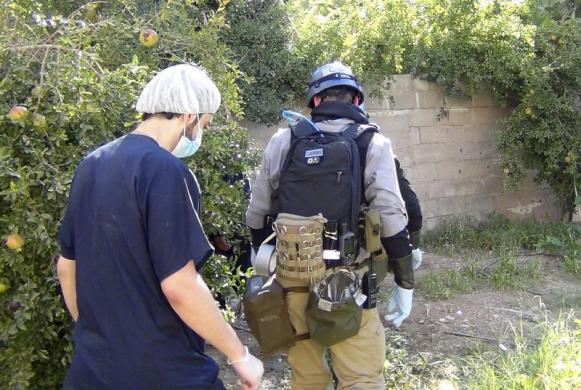
Reactions
Comments Powered by Disqus